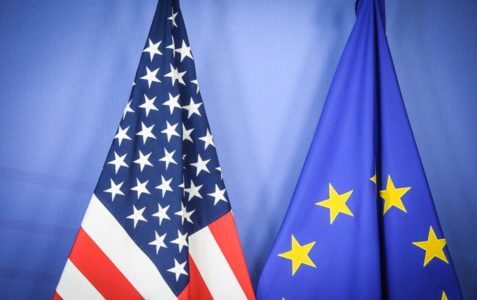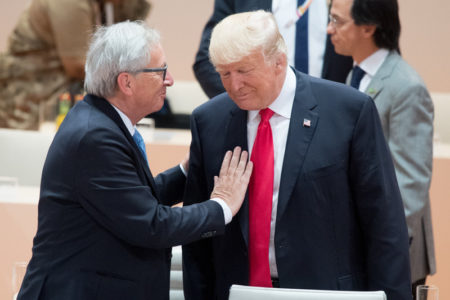What Is It Good For, Absolutely Nothing
On EU – US Trade War & Relations

Source: European Parliament
We often see how time flies by reflecting on old movies. A particular one I had in mind was Rush Hour, which was released exactly 20 years ago. It is a typical light-hearted action comedy, staring Jackie Chan and Chris Tucker. The movie director relied heavily on the humour based on cultural and mentality differences between an American and a Hong Kong cop, who are forced to work together. At a certain point the duo started a mutual hatred and wanted to ban each other from their countries, but realised that only by putting their differences aside they could solve the problem. I have to say that their dialogues were quite funny. In the world of politics, the current relationship between the EU and the US is far from funny, on the contrary, it is quite sad.
Pretty much everyone is aware that the relationship between the two powers deteriorated since the 2016 US Presidential elections, which resulted in a victory of a candidate who pretty much turned most of the EU against him, by making controversial remarks in his presidential campaign. I am not going to repeat them, they are well-known even to people who are not engaged in everyday politics. To name all of the stunts chronologically since President Trump gained power would require something much more than a blog post, so I will focus on some key issues.
First of all, we need to be aware that the unpredictability of the current US President is something that the officials in Brussels are not used to. Although these days certain EU media outlets are already paraphrasing the eternal diplomatic mastermind Henry Kissinger and his famous question on who to call if you want to talk to the EU (By asking the same question regarding the current administration in Washington), there is a certain understanding on how does Washington function nowadays. It is practically a coalition which ranges from the traditional conservative segments of the Republican Party embodied through Vice President Mike Pence, to pragmatists and business-oriented people embodied by Rex Tillerson, until now the US Secretary of State.
However, it seems that the old spirits of notorious alt-right guru Steve Bannon have woken up again in the past couple of weeks, as the Trump administration launched tariffs on aluminium and steel, wanting to provoke new trade talks by claiming it is a matter of US national security. Bannon, who is now touring Europe and walking through Rome and Front National gatherings, was back in the days claiming that the US needs to negotiate new trade agreements with every EU country on a bilateral basis. As the term red line is very popular nowadays, this example could definitely be seen as an EU red line. The EU trade Commissioner Cecilia Malmström was furious with the US decision and questioned at a press conference the EU – US partnership, emphasizing that the EU will know how to respond to a potential trade war.

Jean-Claude Juncker & Donald Trump (Source: Euobserver)
How the issue may be solved remains to be seen, with the always calm and diplomatic Council President Donald Tusk tweeting that Mr. Trump should make trades, not war. Another problem connected to this is the withdrawal of the US from the Paris agreement on climate change, which especially infuriated France. Last and not least, the cacophony in the EU – US relations are not only restricted to trade and climate change, but especially on certain foreign policy issues.
As Rex Tillerson was sacked this week from the position of the Secretary of State, there is probably strong concern in the Cabinet of the EU High Commissioner Federica Mogherini. Having in mind already acknowledged differences on issues such as the Iran deal or the status of Jerusalem, there is tough uncertainty on how the new Secretary of State Mike Pompeo will act. Regarding NATO relations, the new EU initiative PESCO (Permanent Structured Cooperation) is seen as complementary to NATO, but it is worth noting the timeframe of how the idea developed and how even neutral Ireland joined PESCO.
To sum up the topic, issues such as trade, climate change or the status of Jerusalem have shown obvious differences between the US and the EU, and when compared to the past, the relations can easily be viewed pessimistically. However, the relationship between the US and the EU is far more complex than some aforementioned Hollywood buddy cop movie, but both examples share the common need to cooperate together in order to achieve the mutual benefit/goal. More cooperation, less confrontation, if I may add.
